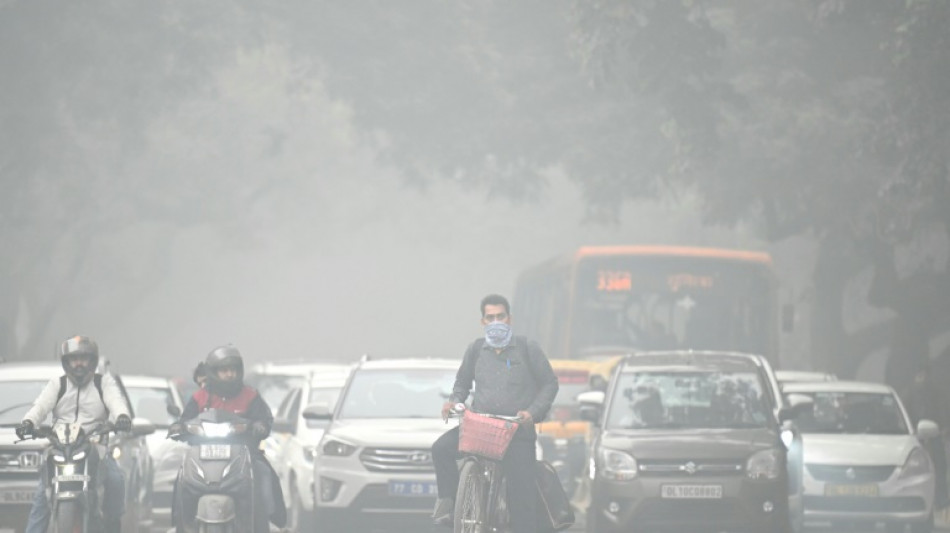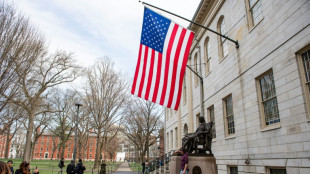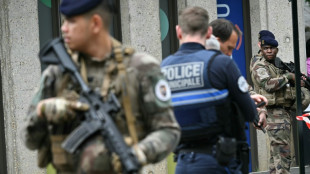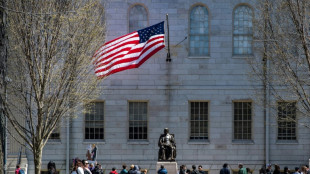
-
 Indian army says new exchange of gunfire with Pakistan
Indian army says new exchange of gunfire with Pakistan
-
Epstein accuser Virginia Giuffre takes own life in Australia: family

-
 Hundreds of buildings damaged, dozens injured in 6.3 Ecuador quake
Hundreds of buildings damaged, dozens injured in 6.3 Ecuador quake
-
India and Pakistan's Kashmir fallout hits economy too

-
 Francis's funeral to be grand farewell to 'pope of the poor'
Francis's funeral to be grand farewell to 'pope of the poor'
-
Pogacar faces defiant Evenepoel at Liege-Bastogne-Liege

-
 Chelsea eye great escape against Barcelona in Women's Champions League
Chelsea eye great escape against Barcelona in Women's Champions League
-
Iran, US to hold new round of high-level nuclear talks

-
 'Energy and effort' pay off for Reds as Blues' woes continue
'Energy and effort' pay off for Reds as Blues' woes continue
-
Albatross and closing birdie lift China's Liu to LPGA Chevron lead

-
 On the horizon? Wave of momentum for high seas treaty
On the horizon? Wave of momentum for high seas treaty
-
Developing countries should fast-track US trade deals: World Bank president

-
 Grizzlies' Morant 'doubtful' for must-win game 4 v Thunder
Grizzlies' Morant 'doubtful' for must-win game 4 v Thunder
-
Trump in Rome for pope funeral in first foreign trip of new term

-
 Trump says Russia-Ukraine deal 'very close' after new Kremlin talks
Trump says Russia-Ukraine deal 'very close' after new Kremlin talks
-
US rookies lead PGA pairs event with McIlroy and Lowry in hunt

-
 Trump tariff promises get a reality check
Trump tariff promises get a reality check
-
Warriors coach Kerr 'relatively optimistic' injured Butler will play game 3

-
 Postecoglou hopes 'Stonecutter's Credo' can inspire Spurs
Postecoglou hopes 'Stonecutter's Credo' can inspire Spurs
-
PSG lose unbeaten Ligue 1 record ahead of Arsenal showdown

-
 Venezuela accuses El Salvador president of 'human trafficking'
Venezuela accuses El Salvador president of 'human trafficking'
-
Own goal takes Sundowns to African final against Pyramids

-
 Scores of buildings damaged, 20 injured in Ecuador quake
Scores of buildings damaged, 20 injured in Ecuador quake
-
US stocks extend rally as market eyes busy calendar next week

-
 Pope's death triggers surge of disinformation he fought against
Pope's death triggers surge of disinformation he fought against
-
Rovanpera takes control of Rally Islas Canarias

-
 Zelensky insists Crimea is Ukrainian as US envoy meets Putin
Zelensky insists Crimea is Ukrainian as US envoy meets Putin
-
Patel and Mendis help Sunrisers beat Kings in Dhoni's 400th T20

-
 Copa del Rey ref statements 'unacceptable': Real Madrid after boycotting final build-up
Copa del Rey ref statements 'unacceptable': Real Madrid after boycotting final build-up
-
Insurance CEO's accused killer pleads not guilty to federal murder charges

-
 FBI arrests Wisconsin judge for shielding undocumented migrant
FBI arrests Wisconsin judge for shielding undocumented migrant
-
Brazil ex-president Collor de Mello jailed for corruption

-
 Zelensky insists Crimea 'belongs' to Ukraine as US envoy meets Putin
Zelensky insists Crimea 'belongs' to Ukraine as US envoy meets Putin
-
Real Madrid boycott Copa del Rey build-up over referee complaints

-
 Trinidad and Tobago votes for parliament, PM, with opposition in lead
Trinidad and Tobago votes for parliament, PM, with opposition in lead
-
IMF chief hails 'constructive' Spring Meetings held under tariff uncertainty

-
 Iran FM Araghchi in Oman ahead of nuclear talks with US
Iran FM Araghchi in Oman ahead of nuclear talks with US
-
Dozens of buildings destroyed, 20 injured in Ecuador quake

-
 Young Barca must 'enjoy' Real Madrid Copa final fight: Flick
Young Barca must 'enjoy' Real Madrid Copa final fight: Flick
-
Pakistan and India border closure separates families

-
 Brazil's Bolsonaro 'stable' after post-surgery setback
Brazil's Bolsonaro 'stable' after post-surgery setback
-
Catholics in secular Cuba hail Francis as 'bridge'

-
 US envoy Witkoff, Putin discuss 'possibility' of direct Russia-Ukraine talks
US envoy Witkoff, Putin discuss 'possibility' of direct Russia-Ukraine talks
-
Community seeks answers after French school knife killing

-
 German prosecutors seek jail terms in VW 'dieselgate' trial
German prosecutors seek jail terms in VW 'dieselgate' trial
-
Sabalenka makes winning start at Madrid Open

-
 EU, US should de-escalate and negotiate trade deal: IMF Europe director
EU, US should de-escalate and negotiate trade deal: IMF Europe director
-
Russia accuses Ukraine of killing general in car bombing

-
 Emery wants FA Cup glory and Champions League berth for Villa
Emery wants FA Cup glory and Champions League berth for Villa
-
Buildings destroyed, one injured in Ecuador quake


Mounting economic costs of India's killer smog
Noxious smog smothering the plains of north India is not only choking the lungs of residents and killing millions, but also slowing the country's economic growth.
India's capital New Delhi frequently ranks among the world's most polluted cities. Each winter, vehicle and factory emissions couple with farm fires from surrounding states to blanket the city in a dystopian haze.
Acrid smog this month contains more than 50 times the World Health Organization recommended limit of fine particulate matter -- dangerous cancer-causing microparticles known as PM2.5 pollutants, that enter the bloodstream through the lungs.
Experts say India's worsening air pollution is having a ruinous impact on its economy -- with one study estimating losses to the tune of $95 billion annually, or roughly three percent of the country's GDP.
The true extent of the economic price India is paying could be even greater.
"The externality costs are huge and you can't assign a value to it," said Vibhuti Garg, of the Institute for Energy Economics and Financial Analysis.
Bhargav Krishna of the Delhi-based research collective Sustainable Futures Collaborative said "costs add up in every phase".
"From missing a day at work to developing chronic illness, the health costs associated with that, to premature death and the impact that has on the family of the person," Krishna told AFP.
- 'Health and wealth hazard'-
Still, several studies have tried to quantify the damage.
One by the global consultancy firm Dalberg concluded that in 2019, air pollution cost Indian businesses $95 billion due to "reduced productivity, work absences and premature death".
The amount is nearly three percent of India's budget, and roughly twice its annual public health expenditure.
"India lost 3.8 billion working days in 2019, costing $44 billion to air pollution caused by deaths," according to the study which calculated that toxic air "contributes to 18 percent of all deaths in India".
Pollution has also had a debilitating impact on the consumer economy because of direct health-related eventualities, the study said, reducing footfall and causing annual losses of $22 billion.
The numbers are even more staggering for Delhi, the epicentre of the crisis, with the capital province losing as much as six percent of its GDP annually to air pollution.
Restaurateur Sandeep Anand Goyle called the smog a "health and wealth hazard".
"People who are health conscious avoid stepping out so we suffer," said Goyle, who heads the Delhi chapter of the National Restaurant Association of India.
Tourism has also been impacted, as the smog season coincides with the period when foreigners traditionally visit northern India -- too hot for many during the blisteringly hot summers.
"The smog is giving a bad name to India's image," said Rajiv Mehra of the Indian Association of Tour Operators.
Delhi faces an average 275 days of unhealthy air a year, according to monitors.
- 'Premature deaths' -
Piecemeal initiatives by the government -- -- that critics call half-hearted -- have failed to adequately address the problem.
Academic research indicates that its detrimental impact on the Indian economy is adding up.
A 2023 World Bank paper said that air pollution's "micro-level" impacts on the economy translate to "macro-level effects that can be observed in year-to-year changes in GDP".
The paper estimates that India's GDP would have been 4.5 percent higher at the end of 2023, had the country managed to curb pollution by half in the previous 25 years.
Another study published in the Lancet health journal on the direct health impacts of air pollution in 2019 estimated an annual GDP deceleration of 1.36 percent due to "lost output from premature deaths and morbidity".
Desperate emergency curbs -- such as shuttering schools to reduce traffic emissions as well as banning construction -- come with their own economic costs.
"Stopping work for weeks on end every winter makes our schedules go awry, and we end up overshooting budgets," said Sanjeev Bansal, the chairman of the Delhi unit of the Builders Association of India.
Pollution's impact on the Indian economy is likely to get worse if action is not taken.
With India's median age expected to rise to 32 by 2030, the Dalberg study predicts that "susceptibility to air pollution will increase, as will the impact on mortality".
F.Bennett--AMWN


